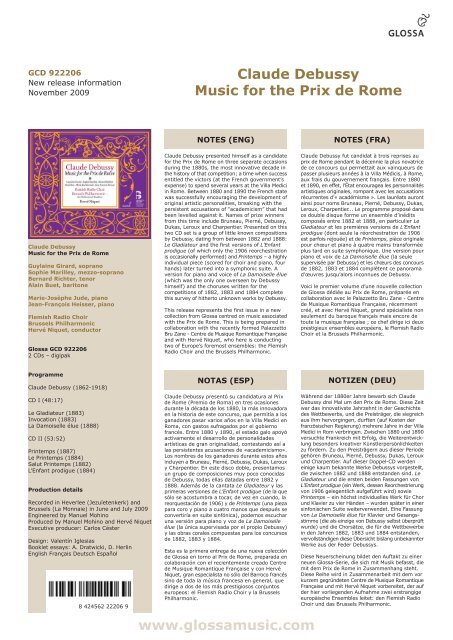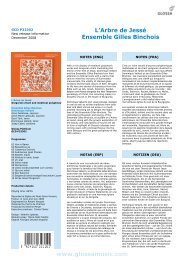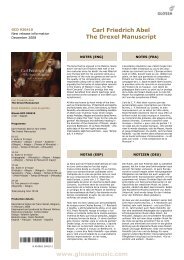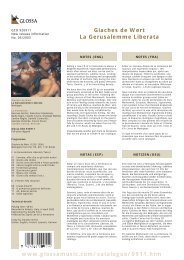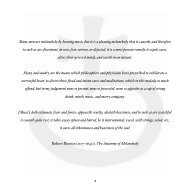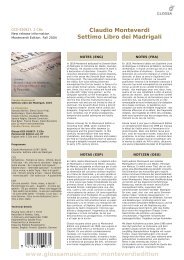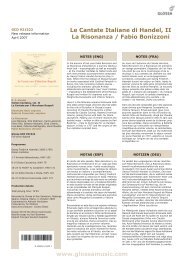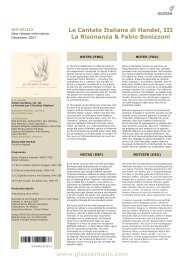Commercial release sheet (PDF) - Glossa Music
Commercial release sheet (PDF) - Glossa Music
Commercial release sheet (PDF) - Glossa Music
You also want an ePaper? Increase the reach of your titles
YUMPU automatically turns print PDFs into web optimized ePapers that Google loves.
GCD 922206<br />
New <strong>release</strong> information<br />
November 2009<br />
Claude Debussy<br />
<strong>Music</strong> for the Prix de Rome<br />
Guylaine Girard, soprano<br />
Sophie Marilley, mezzo-soprano<br />
Bernard Richter, tenor<br />
Alain Buet, baritone<br />
Marie-Josèphe Jude, piano<br />
Jean-François Heisser, piano<br />
Flemish Radio Choir<br />
Brussels Philharmonic<br />
Hervé Niquet, conductor<br />
<strong>Glossa</strong> GCD 922206<br />
2 CDs – digipak<br />
Programme<br />
Claude Debussy (1862-1918)<br />
CD I (48:17)<br />
Le Gladiateur (1883)<br />
Invocation (1883)<br />
La Damoiselle élue (1888)<br />
CD II (53:52)<br />
Printemps (1887)<br />
Le Printemps (1884)<br />
Salut Printemps (1882)<br />
L’Enfant prodigue (1884)<br />
Production details<br />
Recorded in Heverlee (Jezuïetenkerk) and<br />
Brussels (La Monnaie) in June and July 2009<br />
Engineered by Manuel Mohino<br />
Produced by Manuel Mohino and Hervé Niquet<br />
Executive producer: Carlos Céster<br />
Design: Valentín Iglesias<br />
Booklet essays: A. Dratwicki, D. Herlin<br />
English Français Deutsch Español<br />
8 424562 22206 9<br />
Claude Debussy<br />
<strong>Music</strong> for the Prix de Rome<br />
NOTES (ENG)<br />
Claude Debussy presented himself as a candidate<br />
for the Prix de Rome on three separate occasions<br />
during the 1880s, the most innovative decade in<br />
the history of that competition; a time when success<br />
entitled the victors (at the French government’s<br />
expense) to spend several years at the Villa Medici<br />
in Rome. Between 1880 and 1890 the French state<br />
was successfully encouraging the development of<br />
original artistic personalities, breaking with the<br />
persistent accusations of “academicism” that had<br />
been levelled against it. Names of prize winners<br />
from this time include Bruneau, Pierné, Debussy,<br />
Dukas, Leroux and Charpentier. Presented on this<br />
two CD set is a group of little known compositions<br />
by Debussy, dating from between 1882 and 1888:<br />
Le Gladiateur and the first versions of L’Enfant<br />
prodigue (of which only the 1906 reorchestration<br />
is occasionally performed) and Printemps – a highly<br />
individual piece (scored for choir and piano, four<br />
hands) later turned into a symphonic suite. A<br />
version for piano and voice of La Damoiselle élue<br />
(which was the only one overseen by Debussy<br />
himself) and the choruses written for the<br />
competitions of 1882, 1883 and 1884 complete<br />
this survey of hitherto unknown works by Debussy.<br />
This <strong>release</strong> represents the first issue in a new<br />
collection from <strong>Glossa</strong> centred on music associated<br />
with the Prix de Rome. This is being prepared in<br />
collaboration with the recently formed Palazzetto<br />
Bru Zane - Centre de Musique Romantique Française<br />
and with Hervé Niquet, who here is conducting<br />
two of Europe’s foremost ensembles: the Flemish<br />
Radio Choir and the Brussels Philharmonic.<br />
NOTAS (ESP)<br />
Claude Debussy presentó su candidatura al Prix<br />
de Rome (Premio de Roma) en tres ocasiones<br />
durante la década de los 1880, la más innovadora<br />
en la historia de este concurso, que permitía a los<br />
ganadores pasar varios años en la Villa Medici en<br />
Roma, con gastos sufragados por el gobierno<br />
francés. Entre 1880 y 1890, el estado galo apoyó<br />
activamente el desarrollo de personalidades<br />
artísticas de gran originalidad, contestando así a<br />
las persistentes acusaciones de «academicismo».<br />
Los nombres de los ganadores durante estos años<br />
incluyen a Bruneau, Pierné, Debussy, Dukas, Leroux<br />
y Charpentier. En este disco doble, presentamos<br />
un grupo de composiciones muy poco conocidas<br />
de Debussy, todas ellas datadas entre 1882 y<br />
1888. Además de la cantata Le Gladiateur y las<br />
primeras versiones de L’Enfant prodigue (de la que<br />
sólo se acostumbra a tocar, de vez en cuando, la<br />
reorquestación de 1906) y de Printemps (una pieza<br />
para coro y piano a cuatro manos que después se<br />
convertiría en suite sinfónica), podemos escuchar<br />
una versión para piano y voz de La Damoiselle<br />
élue (la única supervisada por el propio Debussy)<br />
y las obras corales compuestas para los concursos<br />
de 1882, 1883 y 1884.<br />
Esta es la primera entrega de una nueva colección<br />
de <strong>Glossa</strong> en torno al Prix de Rome, preparada en<br />
colaboración con el recientemente creado Centre<br />
de Musique Romantique Française y con Hervé<br />
Niquet, gran especialista no sólo del Barroco francés<br />
sino de toda la música francesa en general, que<br />
dirige a dos de los más prestigiosos conjuntos<br />
europeos: el Flemish Radio Choir y la Brussels<br />
Philharmonic.<br />
www.glossamusic.com<br />
NOTES (FRA)<br />
Claude Debussy fut candidat à trois reprises au<br />
prix de Rome pendant la décennie la plus novatrice<br />
de ce concours qui permettait aux vainqueurs de<br />
passer plusieurs années à la Villa Médicis, à Rome,<br />
aux frais du gouvernement français. Entre 1880<br />
et 1890, en effet, l’État encouragea les personnalités<br />
artistiques originales, rompant avec les accusations<br />
récurrentes d’« académisme ». Les lauréats auront<br />
ainsi pour noms Bruneau, Pierné, Debussy, Dukas,<br />
Leroux, Charpentier... Le programme proposé dans<br />
ce double disque forme un ensemble d’inédits<br />
composés entre 1882 et 1888, en particulier Le<br />
Gladiateur et les premières versions de L’Enfant<br />
prodigue (dont seule la réorchestration de 1906<br />
est parfois rejouée) et de Printemps, pièce originale<br />
pour chœur et piano à quatre mains transformée<br />
plus tard en suite symphonique. Une version pour<br />
piano et voix de La Damoiselle élue (la seule<br />
supervisée par Debussy) et les chœurs des concours<br />
de 1882, 1883 et 1884 complètent ce panorama<br />
d’œuvres jusqu’alors inconnues de Debussy.<br />
Voici le premier volume d’une nouvelle collection<br />
de <strong>Glossa</strong> dédiée au Prix de Rome, préparée en<br />
collaboration avec le Palazzetto Bru Zane - Centre<br />
de Musique Romantique Française, récemment<br />
créé, et avec Hervé Niquet, grand spécialiste non<br />
seulement du baroque français mais encore de<br />
toute la musique française ; ce chef dirige ici deux<br />
prestigieux ensembles européens, le Flemish Radio<br />
Choir et la Brussels Philharmonic.<br />
NOTIZEN (DEU)<br />
Während der 1880er Jahre bewarb sich Claude<br />
Debussy drei Mal um den Prix de Rome. Diese Zeit<br />
war das innovativste Jahrzehnt in der Geschichte<br />
des Wettbewerbs, und die Preisträger, die siegreich<br />
aus ihm hervorgingen, durften (auf Kosten der<br />
französischen Regierung) mehrere Jahre in der Villa<br />
Medici in Rom verbringen. Zwischen 1880 und 1890<br />
versuchte Frankreich mit Erfolg, die Weiterentwicklung<br />
besonders kreativer Künstlerpersönlichkeiten<br />
zu fördern. Zu den Preisträgern aus dieser Periode<br />
gehören Bruneau, Pierné, Debussy, Dukas, Leroux<br />
und Charpentier. Auf dieser Doppel-CD werden<br />
einige kaum bekannte Werke Debussys vorgestellt,<br />
die zwischen 1882 und 1888 entstanden sind. Le<br />
Gladiateur und die ersten beiden Fassungen von<br />
L’Enfant prodigue (ein Werk, dessen Reorchestrierung<br />
von 1906 gelegentlich aufgeführt wird) sowie<br />
Printemps – ein höchst individuelles Werk für Chor<br />
und Klavier zu vier Händen – wurden später in einer<br />
sinfonischen Suite weiterverwendet. Eine Fassung<br />
von La Damoiselle élue für Klavier und Gesangsstimme<br />
(die als einzige von Debussy selbst überprüft<br />
wurde) und die Chorsätze, die für die Wettbewerbe<br />
in den Jahren 1882, 1883 und 1884 entstanden,<br />
vervollständigen diese Übersicht bislang unbekannter<br />
Werke aus der Feder Debussys.<br />
Diese Neuerscheinung bildet den Auftakt zu einer<br />
neuen <strong>Glossa</strong>-Serie, die sich mit Musik befasst, die<br />
mit dem Prix de Rome in Zusammenhang steht.<br />
Diese Reihe wird in Zusammenarbeit mit dem vor<br />
kurzem gegründeten Centre de Musique Romantique<br />
Française und mit Hervé Niquet vorbereitet, der auf<br />
der hier vorliegenden Aufnahme zwei erstrangige<br />
europäische Ensembles leitet: den Flemish Radio<br />
Choir und das Brussels Philharmonic.
For all of Hervé Niquet’s credentials in the world<br />
of Baroque music (not least a substantial body<br />
of recorded work encompassing the music of<br />
Charpentier, Lully, Marais, Destouches,<br />
Desmarest from France as well as the recent<br />
<strong>release</strong> on DVD of Purcell’s King Arthur), the<br />
conductor will tell you that as far as French<br />
music is concerned he sees no division between<br />
Lully and Satie. He did, after all, study with a<br />
pupil of Maurice Ravel and Marguerite Long and<br />
he spent formative educational years as a singer<br />
at the Opéra de Paris. For many years he has<br />
matched the work he carries out with his own<br />
Le Concert Spirituel with conducting modern<br />
orchestras in far more modern repertoire. And<br />
so, finding him at the helm of the Brussels<br />
Philharmonic recording Debussy for <strong>Glossa</strong><br />
should come as no real surprise. Niquet has<br />
had a long involvement with the Centre de<br />
Musique Baroque in Versailles and now is<br />
extending that particular process of research<br />
which yields performances (and recordings)<br />
with the newly-created Centre de Musique<br />
Romantique Française based in the Palazzetto<br />
Bru Zane in Venice, with Nicole Bru as its patron.<br />
Nor does this new <strong>release</strong> represent a one-off<br />
exercise in approaching scores well-known to<br />
one and all. Instead Claude Debussy: <strong>Music</strong> for<br />
the Prix de Rome marks the outset of an<br />
important new collection, set to embrace an<br />
important body of works written by French<br />
composers associated with a competition,<br />
organized through the French state in its<br />
different manifestations all the way from 1803<br />
through to 1968 – and where many of these<br />
compositions, however famous their composer<br />
became, remain forgotten today.<br />
Some of the works recorded earlier this year<br />
for this first <strong>release</strong> bear titles which will resonate<br />
little with music lovers (Le Gladiateur, Salut<br />
printemps, Invocation), and even better-known<br />
pieces such as La Damoiselle élue and L’Enfant<br />
prodigue appear here in earlier and different<br />
scorings, closely linked with Debussy’s efforts<br />
in the 1880s to win the prestigious Prix de<br />
Rome. The competition rules required a series<br />
of vocal compositions to be written with further<br />
envois demanded if the composer passed to<br />
the stage of being able to stay in the Villa Medici<br />
in Rome. In the accompanying booklet to Hervé<br />
Niquet’s recording the fascinating essays of<br />
Alexandre Dratwicki and Denis Herlin examine<br />
the history of the Prix de Rome and Claude<br />
Debussy’s part in it. Hervé Niquet was<br />
persuaded to tear himself away from all his<br />
investigations, conducting and recording<br />
activities and reflect on this new stage in his<br />
career – and on French Romantic music.<br />
An interview with<br />
Hervé Niquet<br />
What is your attitude to the new Centre<br />
de Musique Romantique Française and it<br />
being based in Venice?<br />
Being able to work – do research and create<br />
editions – on music from the period 1790-1930<br />
realizes for me a dream that I had when I was<br />
younger. After all, French music consists of all<br />
French music, not just the Baroque and<br />
individual later composers. In Venice I have a<br />
team of researchers who have the same working<br />
habits as their counterparts in Baroque music.<br />
And why shouldn’t the CMRF be based in Venice?<br />
There we have a great patron in Nicole Bru<br />
who offered us the money to save French<br />
Romantic music and a place to work in. French<br />
Romantic music is so important that whether<br />
it is Venice, Paris or Canada that is suggested<br />
as the location for the study of it, we must do<br />
it. And do remember, also, that one of the most<br />
important figures in the recent interpretation<br />
of Hector Berlioz’ music is not exactly French:<br />
Colin Davis!<br />
The first <strong>release</strong> in your new collection<br />
focuses on the music of Claude Debussy<br />
written in connection with the Prix de<br />
Rome. What was the importance of this<br />
competition in Debussy’s day?<br />
It was very important. All the important<br />
composers entered for the competition, even<br />
if it meant moving away from Paris and France<br />
and living in the Villa Medici in Rome. At this<br />
time fashions and tastes were very quickmoving.<br />
However important Paris was, Rome<br />
gave the composers a sense of identity and<br />
they were able to meet many other people<br />
there with a completely different frame of mind<br />
than that found in the French capital. Composers<br />
produced many great works in Rome – they<br />
were obliged to compose all sorts of music:<br />
masses, symphonies, quartets, cantatas,<br />
choruses – and it was a very good exercise to<br />
do this. At the end of their lives, many of them<br />
reflected very positively on their time in Rome<br />
and the lessons learnt there.<br />
Was Debussy himself happy with the<br />
scores that he wrote for the Prix de Rome,<br />
even if, clearly, the judges were not always<br />
appreciative of what he had composed?<br />
He never heard Le Gladiateur as the Académie<br />
des Beaux-Arts in Paris didn’t play the piece<br />
(although he was able to hear L’Enfant prodigue<br />
there), and ten years later he had forgotten<br />
that he had written this piece when his publisher,<br />
Durand, proposed doing an edition. Perhaps<br />
Debussy was composing so much at this time!<br />
However, even if one might later forget having<br />
written such a piece I think that nonetheless<br />
for a composer every piece is important. With<br />
both Le Gladiateur and L’Enfant prodigue<br />
Debussy involved himself in some very hard<br />
work in the effort of producing a natural way<br />
of singing in French for the performers. At the<br />
time he believed that he was the first composer<br />
to try and invent a new musical language by<br />
carrying out this kind of mathematical and<br />
scientific form of vocal production in the French<br />
language; little did he know that Lully had done<br />
this some 300 years beforehand! In effect,<br />
the judges of the Prix de Rome (as opposed to<br />
www.glossamusic.com<br />
Debussy’s teachers) essentially represented<br />
the taste of audiences and critics as they operate<br />
with live performances of music. Even if<br />
sometimes the jury at the competition managed<br />
to mix art with politics nonetheless the members<br />
embodied the conservative or modern responses<br />
typical of criticism. And when you are an artist<br />
it is normal that you have critics, be they good<br />
or bad.<br />
What is your opinion of 19th-century<br />
French music in general?<br />
I just love French music! Maybe my taste is<br />
poor, but when I hear the sacred music, for<br />
example, of composers such as Saint-Saëns,<br />
Delibes, Gounod I think that this music is great<br />
– it is sweet, heavy and creamy music. And<br />
think also of that fact that the churches of<br />
France when this music was originally performed<br />
were completely full. All the priests of the very<br />
important churches in Paris (as elsewhere) in<br />
those days chose the best composers to do the<br />
same thing as was happening in opera.<br />
Nowadays, the music heard in churches is so<br />
horrible with its guitars and stupid texts. And<br />
there are no people there! <strong>Music</strong> forms part of<br />
the “commerce” of the church: it is a shop with<br />
good music, with a good smell from the incense,<br />
nice robes and decor and paintings. For the<br />
next “Prix de Rome” <strong>release</strong> on <strong>Glossa</strong> we will<br />
be tackling pieces by Camille Saint-Saëns. He<br />
entered the competition many times but he<br />
never managed to win it. So, for instance we<br />
will be recording the chœurs with organ<br />
accompaniment composed by him from his<br />
time with the Prix de Rome.<br />
From a slightly earlier period you have a tragédie<br />
lyrique such as Grétry’s Andromaque, which<br />
for me is a very important piece [to be <strong>release</strong>d<br />
by <strong>Glossa</strong> in Spring 2010]. Now Grétry had<br />
become famous for all the funny opéras<br />
comiques that he had composed (and it is very<br />
difficult to do comedy successfully: if you lose<br />
your audience for 20 seconds, you are finished)<br />
and Andromaque respects all the rules of the<br />
tragédie lyrique and with just four principals<br />
and the choir.<br />
I am also a big fan of Jacques Offenbach’s<br />
music. He was a genius and he liked to laugh.<br />
You can feel this in a work such as La Grande-<br />
Duchesse de Gérolstein [due to be directed by<br />
Niquet with Anne-Sofie von Otter in the Theater<br />
Basel in nine performances over December<br />
2009 and January 2010 – the same production<br />
also visits the Theater an der Wien on January<br />
8 and the Salle Pleyel in Paris on January 11].<br />
Like Saint-Saëns’ music for the church this<br />
theatrical piece acts as a caricature of society.<br />
Offenbach’s intelligence allowed him to create<br />
a strong structure for the opéra bouffe, with<br />
fine melodies and good orchestration, and all<br />
the notes are important. The only shame for<br />
me with Offenbach is that he never composed<br />
tragédies lyriques, but like Debussy and Saint-<br />
Saëns, he represents a strong, typical element<br />
within French music, where the structure of<br />
the music is virtuosic with a lightness and<br />
deftness of touch.<br />
Mark Wiggins<br />
© 2009 MusiContact


